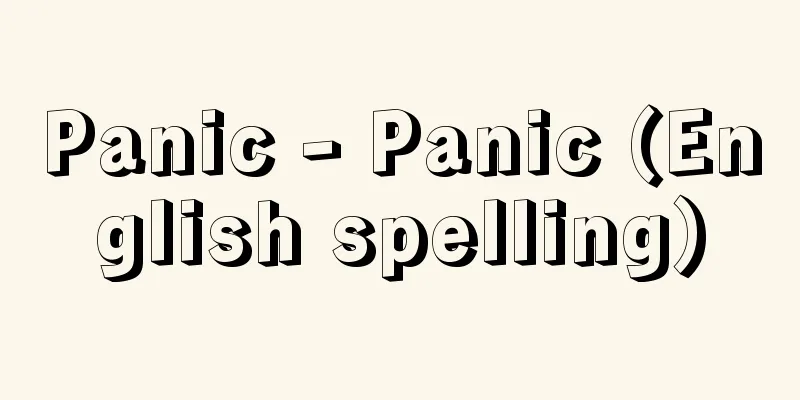Panic - Panic (English spelling)

|
In economic terms, it means a panic. In social psychology, it is called a mob. It refers to an abnormal situation such as a mob avalanche or social chaos that cannot be effectively controlled or regulated, which causes collective actions such as impulsive and irrational avoidance, flight, and acquisition, which occur simultaneously and intensively when people are faced with a real or imagined danger or crisis that threatens their daily lives, such as audiences rushing to the emergency exits after a fire at a theater, or housewives rushing to supermarkets after being fooled by strange information about shortages. In many cases, it is triggered by an unexpected sudden event or incident, but it should not be forgotten that at the base of the panic phenomenon, there is usually a latent anxiety or fear of people about the safety of their lives and property. Today, mass media plays an extremely important role as an information circuit for such events and incidents. In October 1938, a radio dramatization by Orson Welles about a Martian invasion is said to have caused at least one million Americans to panic. Social psychologist H. Cantril, who investigated this panic, pointed out that critical thinking was an important deterrent to panic behavior, and further stated that the listener's personality characteristics and the radio listening conditions were deeply related to the effectiveness of critical thinking. Although it is true that the development and strengthening of critical thinking through education is the "best preventive measure against panic behavior," in the case of social panic phenomena, panic will occur again unless the contradictions and distortions in the political, economic, and cultural spheres of life that foster people's latent anxiety and fear are fundamentally resolved. With the development of disaster sociology and disaster psychology, there has been increasing interest in research into panic phenomena, which are a concern during unavoidable disasters, from the perspective of risk management. [Naoyuki Okada] "Invasion from Mars: The Social Psychology of Panic, by H. Cantril, translated by Saito Koji and Kikuchi Akio (1971, Kawashima Shoten)" ▽ "Introduction to Panicology: Annihilate the Afterimage, by Miyamoto Etsuya (1971, Jiji Press)" ▽ "The Theory of Collective Behavior, by N.J. Smelser, translated by Aida Akira and Kihara Takashi (1973, Seishin Shobo)" ▽ "Panic, edited and commented by Ohara Kenshiro (Gendai no Esprit, No. 128, 1978, Shibundo)" ▽ "The Anthropology of Panic, by Takahashi Ikuo (1982, Asahi Shimbun)" ▽ "Collective Behavior, by J.P. Perry Jr. and M.D. Pugh, translated by Mikami Toshiharu (1983, Tokyo Sogensha)" ▽ "The Human Science of Panic - Disaster Prevention and Safety Crisis Management" by Kitao Abe (1986, Brain Publishing)" ▽ "Panic Experiments - The Social Psychology of Crisis Situations" by Naoki Kugihara (1995, Nakanishiya Publishing)" ▽ "Panic - Rumors and Social Anxiety" by Akira Fujitake (Nikkei Shinsho)" ▽ "The Psychology of Panic - Fear and Madness of the Crowd" by Kitao Abe (Kodansha Gendai Shinsho)" [References] | | | | |Source: Shogakukan Encyclopedia Nipponica About Encyclopedia Nipponica Information | Legend |
|
経済用語としては恐慌のこと。社会心理学では乱衆とよばれる。劇場の火事でわれ先に非常口に殺到する観客、物不足の怪情報に踊らされてスーパーマーケットに押し寄せる主婦などにみられるように、人々の日常生活を脅かす現実の、あるいは想像上の危険ないし危機に直面して、その処理や解決の手段・方法が極度に制約されているとか、ルーティーン化された制度的役割行動が有効性を失うと予想されるために、衝動的、非合理的性格の強い回避、逃走、獲得などの集合行動を同時集中的に引き起こす、有効な統制・規制のとれない群衆なだれや社会的な混乱などの異常事態をいう。多くの場合、予期しない突発的なできごとや事件が引き金になって発生するが、パニック現象の基底に、生命や財産の安全性への人々の潜在的な不安や恐怖が通例存在することを忘れてはならない。こうしたできごとや事件の情報回路として、マス・メディアは今日きわめて重要な役割を担っている。 1938年10月、火星人襲来をテーマにしたオーソン・ウェルズ脚色のラジオドラマは、少なくとも100万のアメリカ人をパニック状態に陥れたといわれている。このパニックを調査研究した社会心理学者H・キャントリルは、批判能力がパニック行動への重要な歯止めであると指摘し、さらに聴取者のパーソナリティー特性とラジオの聴取状況とが批判能力の効果的な働きに深く関連していたと述べている。確かに教育による批判能力の育成と強化は「パニック行動への最良の予防策」であるとしても、社会的なパニック現象の場合、人々の潜在的な不安や恐怖を醸成する政治、経済、文化の生活諸領域における矛盾やひずみが根本的に解消されない限り、パニックはふたたび繰り返されるであろう。災害社会学や災害心理学の発展とともに、不可抗力な災害時に憂慮されるパニック現象へのリスク管理的視点からの研究関心が高まっている。 [岡田直之] 『H・キャントリル著、斎藤耕二・菊池章夫訳『火星からの侵入――パニックの社会心理学』(1971・川島書店)』▽『宮本悦也著『パニック学入門――残像を殲滅せよ』(1971・時事通信社)』▽『N・J・スメルサー著、会田彰・木原孝訳『集合行動の理論』(1973・誠信書房)』▽『大原健士郎編・解説『パニック』(『現代のエスプリ』128号・1978・至文堂)』▽『高橋郁男著『パニック人間学』(1982・朝日新聞社)』▽『J・P・ペリーJr.、M・D・ピュー著、三上俊治訳『集合行動論』(1983・東京創元社)』▽『安倍北夫著『パニックの人間科学――防災と安全の危機管理』(1986・ブレーン出版)』▽『釘原直樹著『パニック実験――危機事態の社会心理学』(1995・ナカニシヤ出版)』▽『藤竹暁著『パニック――流言蜚語と社会不安』(日経新書)』▽『安倍北夫著『パニックの心理――群衆の恐怖と狂気』(講談社現代新書)』 [参照項目] | | | | |出典 小学館 日本大百科全書(ニッポニカ)日本大百科全書(ニッポニカ)について 情報 | 凡例 |
<<: Panizzi, Antonio Genesio Maria
>>: Hani people (Hani tribe) - Hanizoku (English spelling) Hā ní zú
Recommend
Fluorescent whitening agent - fluorescent whitening agent
Also known as fluorescent white dyes. They are co...
Doni, AF (English spelling) DoniAF
...Michelangelo's statement that "the co...
Sweet potato harvest moon - Imo Meigetsu
This refers to the harvest moon that occurs on th...
Itojo Castle
The remains of a Nara period mountain castle (Yam...
Arkadii Isaakovich Raikin
1911‐87 A Soviet light theatre actor. He graduated...
Carnivorous - Meat-eating
It means eating animals, especially the meat of b...
Chelidonium japonicum (English notation) Chelidonium japonicum
… [Morita Tatsuyoshi]. … *Some of the terminology...
Humoral regulation
…The reason why cardiac output, blood flow distri...
Medicago media (English)
…【Hoshikawa Kiyochika】. … *Some of the terminolog...
Palace style poetry - Kyūtaishi
This is a new style of poetry that was written by ...
Secret Book
…According to the common theory, the meaning of t...
Korçë (English spelling)
The administrative centre of the Korçë district in...
Thief God - Nusubitogami
A god worshipped by thieves. There are gods of th...
The Elderly Man - Taijorokun
This is the honorific title given to Laozi, known...
frill shark (洛趷) - frill shark
A marine fish of the frilled shark family in the o...









